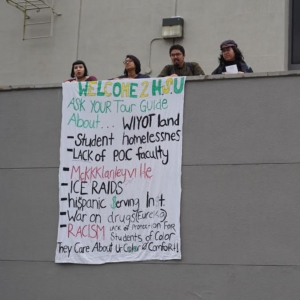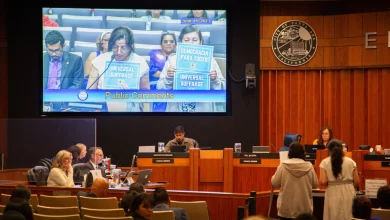
Every year Humboldt State University, located in Humboldt County, vigorously recruits high school students from the inner cities of California to bring them to campus. Most of these are students of color. While this sounds great, HSU has at least one ulterior motive for this aggressive recruitment.
The Federal government allocates funds to “Hispanic Serving Institutions.” To apply for this grant the school must reach an overall general student population of 25 percent Latino, with another grant that can be sought once the student population reaches 50 percent Latino.
HSU also applied for a HSI STEM grant that is meant to help existing programs for people of color in STEM fields or create new programs to help STEM students of color. When HSU got the grant, nstead of funding already existing programs such as the Indian Natural Resource Science and Engineering Program, they decided to fund a summer science program that doesn’t serve the Xicano population here at HSU.
Student organization M.E.Ch.A. De HSU wanted to bring awareness during Spring Preview, an event HSU hosts to promote its campus to potential students. The issues highlighted were topics students and working class members of the community face in Humboldt county and at the self proclaimed liberal school.
While prospective students were in the UC Quad, M.E.Ch.A. dropped two banners. One prompted students to ask their tour guide about theinstitutional racism on campus, the Ku Klux Klan that exist 10 minutes north of campus in the city of Mckinleyville, rising tuition costs, the War on Drugs in Eureka and the lack of P.O.C. staff on campus.
The second banner called out the capitalist property management companies that have a monopoly on rental property in Humboldt county, contributing to the homelessness issue among the local population and students. Property management companies take advantage of students by having them submit paid applications to vacant property and then not reporting back to them in a timely manner if they are selected for the rental. This practice of dragging out the application process contributes to homelessness. These practices along with the lack of expansion of housing within Arcata are major obstacles working class students face.
While the banners were dropped, M.E.Ch.A. seized the opportunity to reach out to the high school students touring the campus by speaking on the housing issues, the overt and covert racism, the ICE raids on immigrants within the community, and acknowledging that HSU was built on stolen Wiyot Land. Many of the kids on the tour expressed appreciation that M.E.Ch.A. was there to provide information that the tour guides did not. Tour guides, paid or volunteered, work off a script to recruit students, found it challenging to explain many of the issues that students of color experience on and off campus.
After a couple of hours M.E.Ch.A. was forced to take down their banners three times, however this didn’t stop them from continuing to call out the capitalist institution by holding them up physically. Eventually the police came out and stopped M.E.Ch.A.’s efforts. However M.E.Ch.A.’s presence was definitely felt by faculty, the administration and the school’s police department. This only shows that the capitalist HSU administration will continue to try to hide the problems students face here in Humboldt County.
There has been a history of student organizations bringing awareness to these issues on this campus. Previously in 2014, organizations such as HSU Students Questioning Institutional Discrimination (SQuID) and M.E.Ch.A performed a similar act highlighting the housing disparities and discriminatory policies from the property management companies. At that time the administration was caught off guard by the action and didn’t take down the banners or intervene in the action. We observed a decrease of the student enrollment and through informants involved in various bureaucratic committees we conclude that these efforts during Spring Preview influenced enrollment. This analysis may be why the institution took a more aggressive stance toward our more recent actions.






